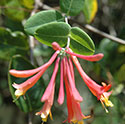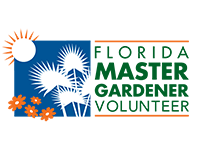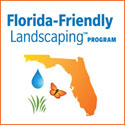The Neighborhood Gardener – August
Happy Gardening!
Transplanting Vegetables
 Jump-start your vegetable garden with transplants! You can start them at home or buy them from a garden center. If growing your own, use a good potting soil and any type of container—recycled milk and egg cartons for example—that has good drainage. When planting seeds directly in the garden, remember that some vegetables don’t easily transplant from the seed row to another part of the garden. More
Jump-start your vegetable garden with transplants! You can start them at home or buy them from a garden center. If growing your own, use a good potting soil and any type of container—recycled milk and egg cartons for example—that has good drainage. When planting seeds directly in the garden, remember that some vegetables don’t easily transplant from the seed row to another part of the garden. More
Mosquito Control in Your Landscape
Mosquitoes are so prolific here in the summer that they're often jokingly referred to as "Florida's other state bird." These pests can ruin your outdoor activities immediately. A mosquito's bite is not only itchy and sometimes painful, but can also transmit diseases in both humans and animals. Learn how to control mosquitoes and protect yourself. More
Watering Houseplants
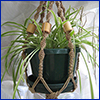 Houseplants are a wonderful addition to your home. They provide warmth and color, and if you choose the right plants, they're not difficult to care for. One of the most important steps in caring for your indoor plants is irrigation. Plant species differ on the amount of water they need, so do your research to determine the proper amount to keep your particular plant healthy. More
Houseplants are a wonderful addition to your home. They provide warmth and color, and if you choose the right plants, they're not difficult to care for. One of the most important steps in caring for your indoor plants is irrigation. Plant species differ on the amount of water they need, so do your research to determine the proper amount to keep your particular plant healthy. More
Plant of the Month: Asiatic Jasmine
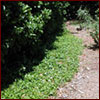 Asiatic jasmine is an evergreen, vine-like woody plant that is commonly used in Florida landscapes due to its hardiness and drought tolerance. Once established, Asiatic jasmine requires little maintenance. This versatile plant can be grown in all areas of Florida, as it can handle cold temperatures as well as very hot ones. It's also salt-tolerant, so it's appropriate for coastal areas. Asiatic jasmine grows well in both dense shade and full sun, and has very few pest, disease, or weed problems. More
Asiatic jasmine is an evergreen, vine-like woody plant that is commonly used in Florida landscapes due to its hardiness and drought tolerance. Once established, Asiatic jasmine requires little maintenance. This versatile plant can be grown in all areas of Florida, as it can handle cold temperatures as well as very hot ones. It's also salt-tolerant, so it's appropriate for coastal areas. Asiatic jasmine grows well in both dense shade and full sun, and has very few pest, disease, or weed problems. More
August in Your Garden
Mid-August is a good time to plant warm-season annuals such as marigolds, salvia, nicotiana, verbena, ornamental peppers, and sunflowers. As older plants decline you should add new ones; inspect the soil for pest infestations before planting new plants. Start cucumbers, beans, squash, and corn from seeds this month and transplant eggplant, pumpkin, pepper, tomato and watermelon seedlings.
For more month-by-month gardening tips, check out the Florida Gardening Calendar. Three different editions of the calendar provide specific tips for each of Florida's gardening regions—North, Central, and South. More
Friend or Foe? Foe: False Parasol Mushroom
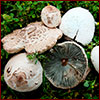 Often seen growing in grassy landscapes, false parasol (Chlorophyllum molybdites)
is a highly poisonous mushroom. White or tan, it has a domed or flat cap and a thick stem; at maturity it may be several inches tall. Colonies often grow in circles, called “fairy rings.” If ingested, false parasol causes gastrointestinal distress in people and can be fatal to dogs and horses. If your animal does eat one of these mushrooms, they should be taken to a veterinarian immediately. Mushrooms sprout up quickly, so pet owners should check their yards often. More
Often seen growing in grassy landscapes, false parasol (Chlorophyllum molybdites)
is a highly poisonous mushroom. White or tan, it has a domed or flat cap and a thick stem; at maturity it may be several inches tall. Colonies often grow in circles, called “fairy rings.” If ingested, false parasol causes gastrointestinal distress in people and can be fatal to dogs and horses. If your animal does eat one of these mushrooms, they should be taken to a veterinarian immediately. Mushrooms sprout up quickly, so pet owners should check their yards often. More
Featured Shows on Gardening in a Minute
Success Stories
- We're looking for inspiring, Florida-Friendly success stories from your county. Submit yours today to Wendy Wilber.

